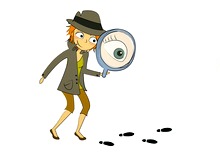| Back to Back Issues Page |
 |
|
English Detective #45, Educating Kids for the Future: Nov. 4,2014 November 04, 2014 |
The current investigation (Introducing this issue):
Most school planning needs to focus on this year and the next-- maybe even a five year plan for the district. However, there is value in stepping back once in a while to see the long-term picture. I think the Common Core standards attempt to do this with their emphasis on critical thinking, problem-solving, and collaboration.
This issue showcases two very different perspectives on the potential needs of the long-term job market, and how schools can prepare their students for a future that will certainly be very different from our present economy.
In this PBS interview, Professor Larry Katz sees a need-- and a future-- for small businesses that add a personal, creative touch to the products they make or the services they offer. (Read more below)
The second article looks even farther ahead, to jobs that don’t yet exist. It’s quite long but well worth scanning for some of the interesting fields and occupations he foresees (192 possible jobs-- 5-10 or so each for a variety of industries that are just starting or don’t yet exist. (Read on for a few examples and some suggestions for student projects...)
Getting the Whole Story (Read more about it!):
 In the PBS interview, Professor Larry Katz sees a need-- and a future-- for small businesses that add a personal, creative touch to the products they make or the services they offer.
In the PBS interview, Professor Larry Katz sees a need-- and a future-- for small businesses that add a personal, creative touch to the products they make or the services they offer.
There may be fewer jobs in the established, standardized sectors of the economy, but more potential for people who can see possibilities in problems or in the new situations that will come up.
To educate students for such a future, he praised the Career Academy model, blending classroom education with hands-on-apprenticeship in which students can apply what they’re learning in real jobs. He recommends a broad liberal arts background with some understanding of science and technology. “The idea is you finish school with a very marketable current skill, but also with a broad set of knowledge and experiences that allows you to move beyond that.”
I'd like to see more education offering what he suggests: combining a good grounding in the liberal arts and sciences with hands-on experience in the "real" world of work. Here is the PBS interview with Professor Katz.
Here's a selection of the 192 jobs the Futurist envisions.
The list below names a few of his proposed jobs. (He also links to more information on each new industry, from Personal Rapid Transit Systems to future sports, commercial drones, 3D printing, the Internet of things, Big Data, micro grid conversion, micro-colleges, senior living, and future agriculture.)
• job 48.Sensor Inventors, Designers, and Engineers • 50. Failure Point Assessors • 51. Data Transmission Optimizers • 107. Driverless “Ride Experience” Designers • 108. Driverless Operating System Engineers • 109. Emergency Crews for when things go wrong. • 112. DNA Scientists • 113. Gene Sequencers • 114. Treatment Monitors • 132. Urban Agriculturalists • 133. Bio-Hacking Inspectors and Security • 140. Government Agency Dismantlers • 141. Education System Dismantlers • 154. Time Brokers – Time Bank Traders – “Where do you go when you run out of time?” Naturally, to the time-bank, and take out a time-loan. • 161. Amnesia Surgeons – “Doctors who are skilled in removing bad memories or destructive behavior.”
Since the jobs are organized by industry, high school student teams could choose a potential industry and its jobs to investigate, then make presentations to the rest of the class (or school, or online audience) about the jobs they find most intriguing.
There is such a variety that I would think almost all students could find one or more they could really get excited about. Possibly they could consider the kind of training necessary for the job, how it would fit into their city or community (or not), and other jobs that are related or would work together with ‘theirs.’
If you don’t have time for all your students to look into it, it might still be an idea for your more restless, creative, or unconventional students who have trouble finding a project. This one would give nearly unlimited scope to their imagination!
Preparing for Jobs that Don’t Exist Yet is here.
Follow the Clues (Academic Vocabulary Practice):
High intermediate and advanced students can read a short overview of the ongoing climate change discussion and practice quite a lot of academic vocabulary in an interactive online gap-fill here or a pdf worksheet (only available to newsletter readers, at least or now) that can be downloaded here. (Right click to download.)
Although the vocabulary is advanced, the gaps aren’t difficult as the words are provided section by section and the meanings are suggested by the context.
A note if you get gmail: Have you missed any issues of English Detective? if you find English Detective in your Promotions box, you can move it to your Primary box (if you want) by clicking on it and dragging it there, then clicking Yes when asked if you want to always get it in the Primary box.
Coming in the next issue: The Value of Stories
P.S. If you are not already getting English Detective, you can subscribe by completing the form here. (It's free!) Also, you can reach me by mail at 1752 Driftwood Drive, El Centro, CA 92243, USA. |
| Back to Back Issues Page |